Why Keyword Research is Important in SEO
Keyword research is a fundamental part of search engine optimization (SEO). It involves analyzing the keywords that people use on search engines like Google.
By studying these key terms, you can discover the most popular search terms people use to find information. However, just because a keyword is popular doesn’t mean it’s the right one for your website or that it will help you attract customers.
Choosing the right keywords for your website is a crucial part of the keyword research process. In other words, keyword research is about discovering the specific phrases your target audience uses to educate themselves and find businesses like yours.
It helps you filter out thousands of keywords into the most important ones relevant to your business goals. This brings keyword research into the center of your marketing strategy because you need these keywords to:
- Reach your target audience
- Optimize your blog pages
- Increase website organic traffic & visibility,
- Grow your brand, and
- Increase revenue.
What are the different types of keywords and common metrics to consider during keyword research?
Common Types of Keywords
There are three main types of keywords, and they are:
1. Short-tail Keywords
Short-tail keywords are one- or two-word phrases known as broad or generic. They tend to have higher search volumes and can drive higher traffic to your website.
In the image below, “running shoes” is the short-tail keyword, while “how long do running shoes last” is the long-tail.
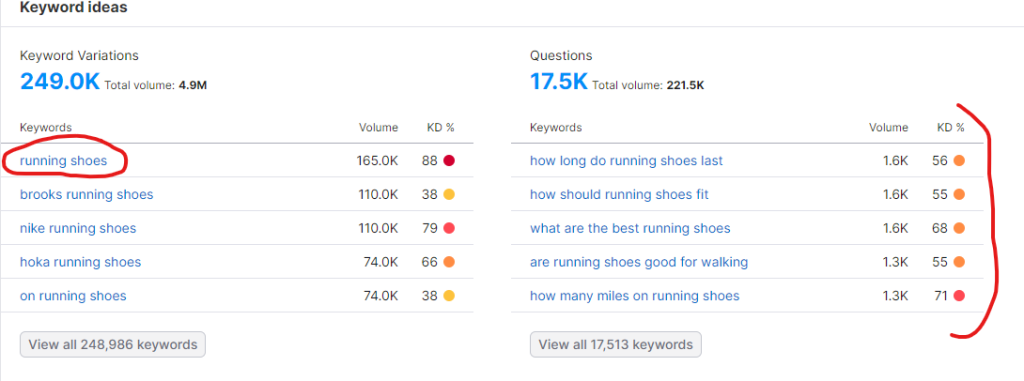
Short-tail keywords are usually the most expensive on paid searches because they are hot topics that most people often search for. An example is “running shoes,” which has 165,000 monthly searches.
However, these keywords tend not to drive high conversion rates because they are broader.
This is because a user searching for short-tail keywords conducts preliminary research to get information about the markets or learn about the topic. They’re typically not searching with buyer intent yet.
2. Long-tail Keywords
Long-tail keywords consist of three or more words or phrases that are more specific than short-tail keywords. While they typically have lower search volumes, they attract a more targeted audience to your website.
For example, the query “Nike running shoes” is more specific than just “running shoes.” In this case, the user is interested in Nike running shoes rather than running shoes in general.
3. Geo-Targeted Keywords
These keywords include location-specific terms, making them crucial for local SEO. For example, “best Italian restaurant in Chicago.” or “Chicago personal injury attorney.”
4. Related Keywords
Modern search engines use advanced algorithms to understand context. Including related terms and phrases conceptually linked to your main keyword can enhance your content’s relevance. For example, if your main keyword is “apple pie,” related keywords might include “baking apple pie,” “apple pie recipe,” and “best apples for pie.”
5. Transactional Keywords
These keywords indicate a user’s intent to purchase or perform a specific action. They often include terms like “buy,” “discount,” or “deal.” For example, “buy Nike running shoes online.”
Common Metrics to Consider During Keyword Research
- Search volume: This metric indicates the average number of times a keyword is searched for in a given period, usually monthly. High search volume keywords can drive more traffic, but they may also be more competitive.

- Keyword difficulty (KD): Also known as SEO difficulty, this metric estimates how challenging it will be to rank for a particular keyword. It considers factors like the strength of competitors’ pages currently ranking for that keyword. A lower KD score generally indicates easier ranking potential.
- Cost Per Click (CPC): This metric is primarily used in paid search advertising and indicates how much advertisers are willing to pay for each click on their ads for a particular keyword. It can give insights into the keyword’s commercial value and competitiveness.
- Click-Through Rate (CTR): This metric shows the percentage of searchers who click on a search result after seeing it. Higher CTR suggests that the keyword is relevant and compelling to users. Some keyword research tools provide estimated organic CTR.
- User Intent: Understanding the intent behind a search query is crucial. Keywords can be informational (seeking information), navigational (looking for a specific website), or transactional (intending to make a purchase). Aligning keywords with user intent can improve your content’s effectiveness and conversion rates.
6 Reasons Keyword Research is Important for SEO
1. It helps to Identify keywords for the buyer’s journey
Mapping out keywords for your buyer’s journey is essential for creating content that aligns with each stage of the buying cycle. The buyer’s journey typically includes the following phases: awareness, consideration, intent, purchase, and repurchase/continuous purchasing.
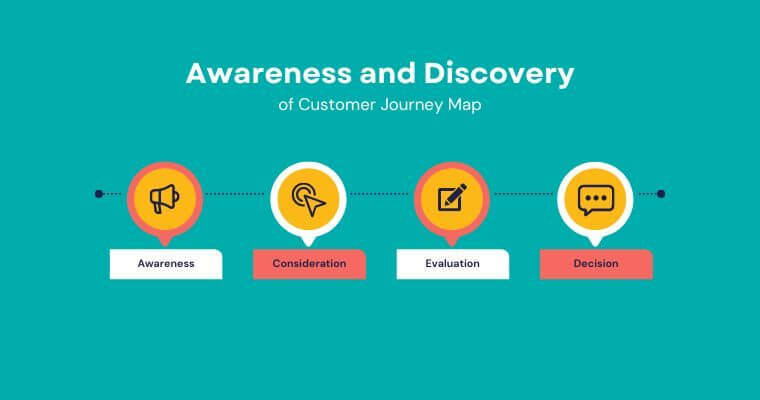
To form a robust marketing strategy, it’s crucial to target keywords that correspond to each of these stages. As buyers progress through the buying cycle, their queries evolve from broad to specific, and your content must adapt to meet their needs at every step.
For example, imagine you run an online store specializing in outdoor gear. A potential customer might start their journey with a broad search query like “best hiking gear for beginners.” At this awareness stage, they seek information and education about what equipment they might need.
As they gather more information and enter the consideration stage, their queries may become more specific, such as “top-rated hiking backpacks” or “lightweight hiking tents.” Here, they compare different products and brands to evaluate their options.
Moving into the intent stage, the customer might search for “purchase ultralight hiking tent” or “buy hiking backpack online.” These queries indicate a readiness to make a purchase and a preference for specific product features.
Finally, after making a purchase, the customer might look for additional products or related items, using queries like “best hiking boots for ultralight tent users” or “discount on hiking gear for returning customers.” This represents the repurchase/continuous purchasing stage, where the customer seeks to complement their initial purchase or take advantage of loyalty programs.
Through comprehensive keyword research, you can identify these varying queries and create targeted content that addresses your audience’s specific needs and intents at each stage of their journey. By doing so, you enhance your visibility in search engine results, attract more organic traffic, and increase the likelihood of conversions, ultimately driving sales and fostering customer loyalty.
By understanding and implementing keywords that cater to the buyer’s journey, you ensure your content is relevant, valuable, and optimized to meet search intent, boosting your SEO efforts and overall marketing strategy.
2. Keyword Research Helps You Understand Customers’ Search Intent
Search intent is the user’s primary goal when typing a query into the search engine. In other words, understanding search intent equals understanding why people type their queries into search engines.
There are four types of search intent: informational, transactional, navigational, and commercial.
- Informational
Informational search intent: “want to know.”
Web users searching for these keywords are information–seeking individuals rather than service-buying individuals. These include how-to articles, listicles, presentations, and in-depth guides into a topic.
Here, you create content that answers their queries and points them to your services or products that solve the problem.
For instance, if you’re an agency like us, and a user Goggles “how to rank my product pages” or “what is local SEO,” you can decide to sync in your services while answering the search query.
As you can see, at the end of the piece on local SEO, we added a section on why they should choose us:
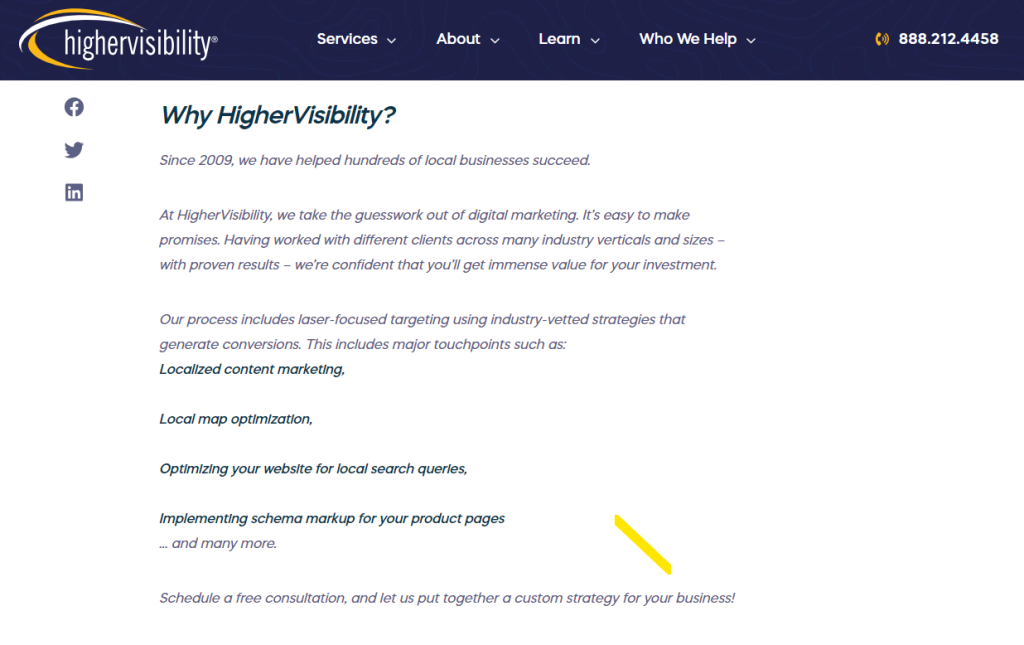
However, the main difference with this search intent is that most visitors may not be your target audience— they want to be educated about the topic and aren’t ready to try out a product or service.
Regardless, sprinkling information about how to help them can create awareness about your offerings.
- Transactional
Transactional search intents are “want to do” searches, indicating that users are ready to buy a product or service or complete a specific action. These searches often involve keywords related to purchasing, subscribing, signing up, or other actions that signify a high level of commercial intent.
An excellent example of a transactional search query is “buy scented candles in bulk” or “buy iPhone 15.”
Here are some of the common words you’d find in transactional search queries:
- Discount
- Order
- Purchase
- Coupon
- Near me
- Buy
- Discount
These keywords are for users ready to buy and can be converted to customers if they love your offers.
- Navigational
Navigational search intents indicate where users want to go, typically when they have a specific website or webpage in mind. These searches are often branded and reveal that the user is looking to navigate directly to a particular site or find specific information within a site.
For example, a user might search for “Facebook login,” “YouTube,” or “Amazon.” These queries suggest that the user knows where they want to go and is using the search engine as a quick way to get there.
- Commercial
Commercial search intent indicates that users are interested in buying but require more information before purchasing. These searches often involve users comparing products, reading reviews, or seeking detailed information to help them evaluate their options.
Keywords in this category can be “best SEO service” or “best accounting software for small businesses.”
You can also create comparison pages and in-depth reviews of features and pricing between different products to rank for commercial intent keywords.
For example, “Alternatives to X,” product comparison pages, best software solutions for X problem, and blog pages about pricing.
Identifying the intent behind each keyword helps you decide whether they align with your current strategy and are worth targeting.
For example, keywords with commercial search intent best show how your product/service is the best in the market.
Why? You’re writing to an audience ready to make purchase decisions but wants to make the best decision.
3. It helps to identify keywords with low competition but high conversion rates.
Keyword research is crucial for identifying keywords that have low competition but high conversion rates. These keywords are often referred to as “low-hanging fruit” because they provide opportunities to drive targeted traffic to your website without having to compete against highly authoritative sites.
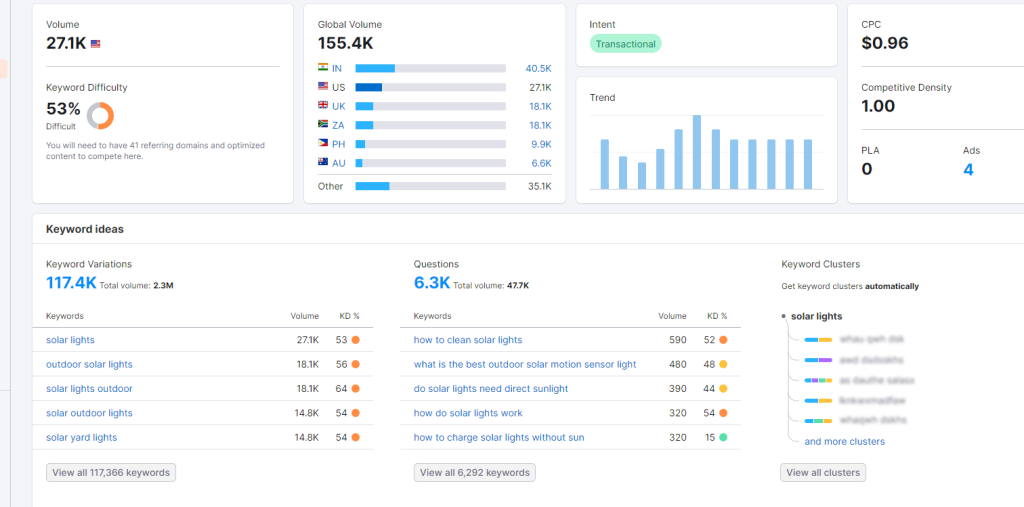
In the image above, a keyword search for “solar lights” reveals a search volume of 27.1k and a keyword difficulty (KD) of 53%. This indicates that while the keyword has a substantial search volume, it is moderately competitive. However, the keyword research tool also offers related keywords that businesses in the solar lights space can optimize for, which might have lower competition and higher conversion rates.
For example, related keywords might include:
- “Best outdoor solar lights”: This keyword has a specific intent, suggesting that users are looking for high-quality options. It may have lower competition compared to the broader term “solar lights,” but it attracts users who are ready to make a purchase.
- “Affordable solar garden lights”: This keyword targets users looking for budget-friendly options, indicating a solid intent to buy while possibly having lower competition.
- “Solar path lights reviews”: This keyword targets users seeking reviews, often preceding a purchase decision. It might have lower competition and attract high-intent traffic.
4. It shapes your content marketing strategy.
Keyword research is crucial for understanding customer search intent and shaping your content strategy. By identifying keywords that drive traffic and increase visibility, you can create content that resonates with your audience and aligns with your business goals.
How to Start:
- Identify Core Topics: Begin by pinpointing the main topics relevant to your niche. These should reflect the services or products you offer. For example, an SEO agency focusing on lead generation should create content around topics like lead generation services and SEO. Avoid unrelated topics like B2B tech tools that don’t align with your business offerings.
- Break Down Topics into Keywords: Once you have your core topics, the next step is to break them down into specific keywords. This is where keyword research becomes invaluable. Use keyword research tools to compile a list of short and long-tail keywords for each topic.
Recommended Keyword Research Tools:
- Answer the Public
- SEMrush
- Moz Keyword Explorer
- Google: Don’t overlook Google’s People Also Ask and Related Searches panels in SERPs, as they provide valuable keyword insights.
Practical Example:
If your SEO agency focuses on lead generation, you might develop broad topics such as “effective lead generation strategies” or “SEO best practices.” Within these topics, you can identify keywords like “lead generation services,” “SEO tips,” or “how to improve lead quality.”
By targeting these specific keywords, you ensure your content is both relevant to your audience’s search queries and aligned with your business objectives.
5. It helps you understand trends and find new keywords.
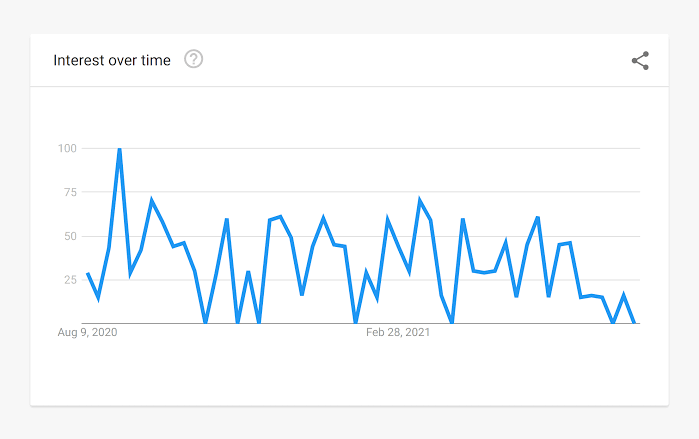
Keyword research is not just about identifying popular search terms; it’s also about understanding when people search for specific keywords. This is especially important for businesses offering seasonal products or services like winter gear, summer activities, or Christmas decorations. These businesses will see higher demand during specific seasons, and identifying trending keywords helps them optimize their pages and create timely content to attract users.
Identifying and Leveraging Trends:
- Seasonal Trends: Businesses can use keyword research to identify when specific keywords peak in popularity. For example, keywords such as “winter coats” will spike as temperatures drop. By recognizing these trends, businesses can optimize their content and marketing efforts to align with seasonal demand.
- Competitor Analysis: Keyword research tools also allow you to analyze your competitors’ content strategies. By exploring their content library, you can uncover trends and new topics they cover, enabling you to create similar or improved content.
Example: Suppose Jeremy White’s Calvin Klein ad is the first viral sensation of 2024. Fashion bloggers and vloggers can capitalize on this trend by creating content about the ad incorporating specific keywords in their titles, thumbnails, and content. A digital marketing agency might analyze why the campaign was successful, demonstrating its expertise in creating viral content and attracting potential clients.
Practical Steps:
- Monitor Trends: Regularly check Google Trends and Exploding Topics to stay updated on emerging trends.
- Keyword Discovery: Use keyword research tools like SEMrush, Ahrefs, or Moz to find relevant keywords for the trends you’ve identified.
- Content Creation: Develop high-quality content around these keywords, ensuring it align with your audience’s interests and needs.
- Optimize and Publish: Optimize your content for SEO, incorporating the identified keywords naturally, and publish it in a timely manner to capitalize on the trend.
6. It helps to increase visibility and traffic.
Keyword research is essential for creating content that resonates with your audience and addresses their needs. By thoroughly analyzing SERPs, you can understand what users search for and create content that answers their queries. This approach boosts your visibility online by helping your content rank higher and drive organic traffic to your site.
Conclusion
The importance of keyword research in SEO cannot be understated. Keyword research is the cornerstone of SEO, enabling you to create content that targets and resonates with your specific audience. By understanding and leveraging keyword insights, you can write content that aligns with your customers’ search intent and effectively addresses their needs.
If you are still trying to get started or identify the best possible strategy for your business, let us create a free strategy customized to your needs.
